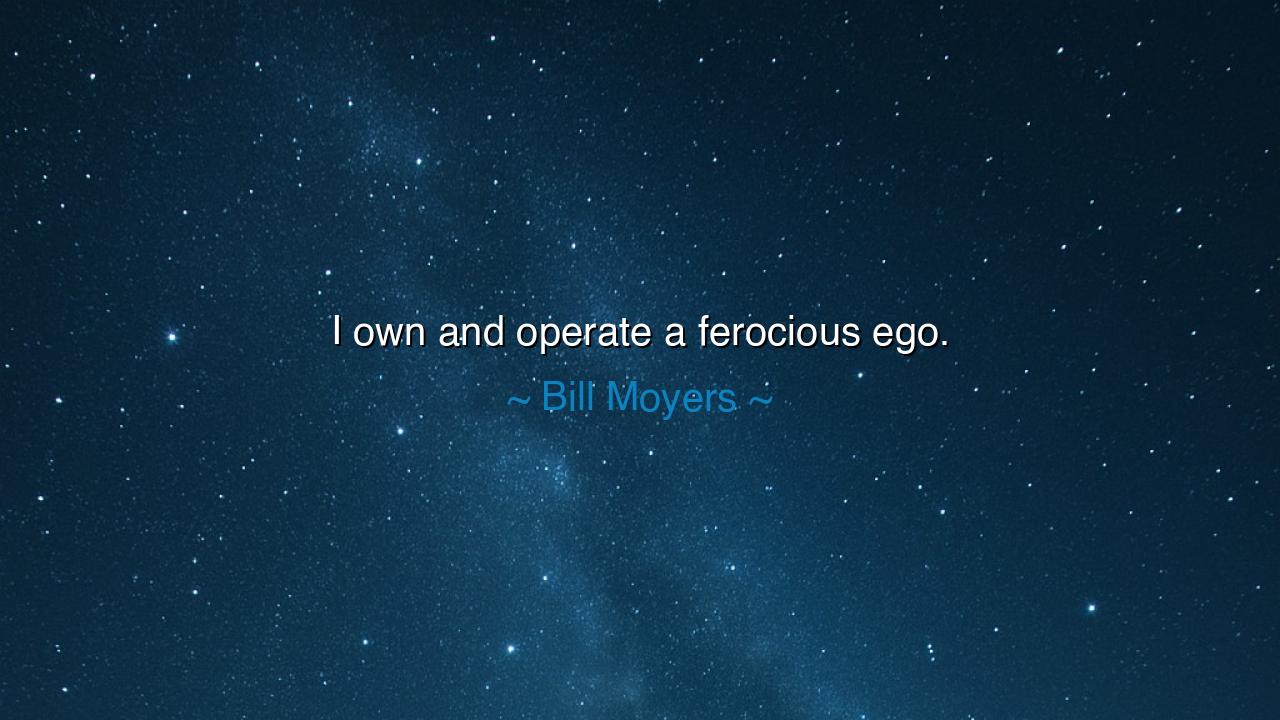
I own and operate a ferocious ego.






Hear me, O children of the earth, for the words of Bill Moyers carry a weight of self-awareness and strength: "I own and operate a ferocious ego." These words, simple in their construction yet profound in their meaning, speak to the power of the ego, that force within us that shapes our perceptions, drives our actions, and often guides the course of our lives. To claim ownership of the ego is not an admission of weakness but an acknowledgment of its power—a recognition that we must not only live with our ego but also understand and control it.
In the ancient world, the ego was both revered and feared. The Greek philosophers, like Socrates and Plato, spoke often of the importance of self-awareness and the need to balance one’s desires with the greater good of society. Socrates famously declared, "Know thyself," urging individuals to reflect on their inner nature and the forces that shaped their actions. The ego, in many ways, was viewed as the unseen driver of human behavior—either a force for personal growth or a disruptive power that, when unchecked, led to hubris and self-destruction. Moyers, by acknowledging his ferocious ego, speaks not of an uncontrolled beast, but of an ego that is owned—acknowledged, understood, and wielded with purpose.
The ego, when understood, becomes a powerful force for achievement. History is filled with great individuals whose egos propelled them to heights of creativity, leadership, and success. Consider the story of Alexander the Great, whose insatiable ambition, fueled by his ego, drove him to conquer vast lands, creating an empire that stretched from Greece to Egypt and into India. But Alexander’s ego was not only a source of strength—it was also his tragic flaw, leading him to excesses, paranoia, and ultimately his untimely death. His story illustrates the delicate balance between harnessing the power of the ego for greatness and the danger of letting it lead unchecked into arrogance and folly.
Moyers’ declaration is also a call to own one’s inner power without letting it dominate one’s life or actions. To operate the ego is to wield it with awareness, knowing when to let it guide you and when to silence its voice. In the greatest leaders, whether they were warriors, poets, or kings, the ego acted as both compass and challenge. King Solomon, wise and powerful, understood that true wisdom came not from suppressing the ego but from channeling it. He embraced his position, but he was also mindful of the responsibility it carried, often seeking balance through his judgments and the wisdom imparted by his own self-reflection.
Moyers’ words are not a celebration of unchecked pride, but a recognition of the ego’s presence in his life, as a powerful and dynamic force. Operating the ego is akin to riding a stallion—a wild and untamed force that must be harnessed and steered toward a purposeful destination. If one rides too recklessly, the stallion may run wild, throwing the rider into chaos. If one is too gentle, the stallion may wander aimlessly, failing to reach its potential. But when ridden with skill and awareness, the ego becomes an instrument of focused ambition, clarity, and action.
The lesson here, O children of the earth, is that we must understand our own egos. We must not shy away from it, nor should we allow it to dominate our lives. To claim ownership over the ego is to take responsibility for its influence over our thoughts, our words, and our actions. We must listen to the voice of our ego, but we must also question it, challenge it, and ensure that it does not lead us astray. As Moyers suggests, the ego is not a force to be feared, but one to be understood and controlled.
In your own lives, O seekers of wisdom, recognize the presence of your ego and embrace it. Know when it serves you—when it gives you the strength to rise, to create, to lead—and know when it blinds you, when it leads you into arrogance or complacency. The power lies in balance—in owning your ego without letting it own you. Seek the wisdom to recognize when your ego serves the greater good and when it leads you astray. In this balance, you will find not only strength, but true mastery over the forces that shape your destiny.






AAdministratorAdministrator
Welcome, honored guests. Please leave a comment, we will respond soon